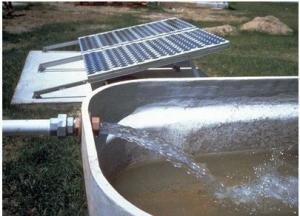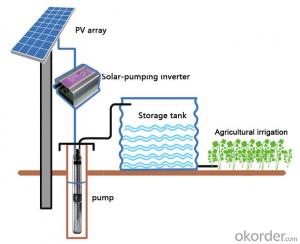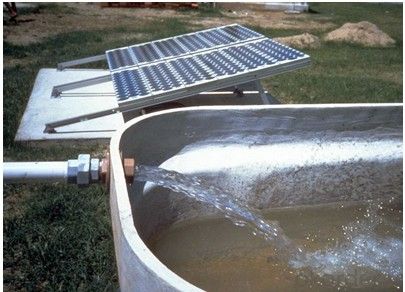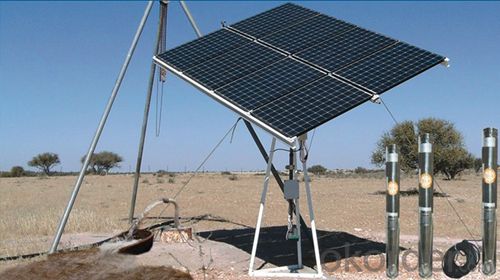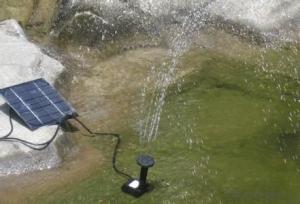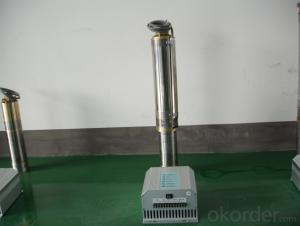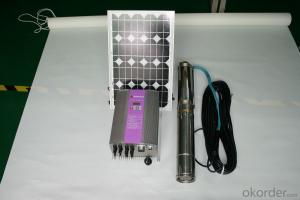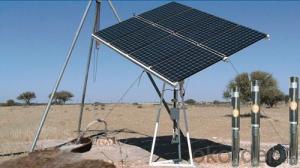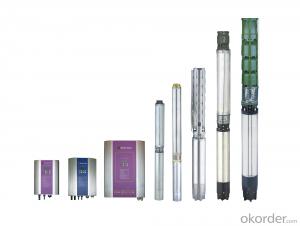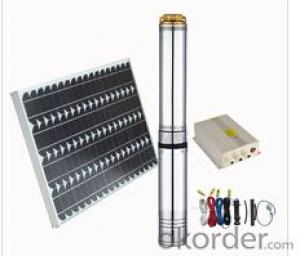Pondmax Solar Pump - Passive Solar Water Heater for Irrigation
- Loading Port:
- Shanghai
- Payment Terms:
- TT OR LC
- Min Order Qty:
- 1 set
- Supply Capability:
- 1000 set/month
OKorder Service Pledge
OKorder Financial Service
You Might Also Like
Passive Solar Water Heater Solar Pumps For Irrigation
DC solar water pumping system consists of the motor, pump, controller, solar array and some other accessories, such as water level sensor, float switch, etc. Considered that storing water is more efficient than storing electricity, the system is designed to directly drive the pump without battery which can reduce the construction and operating cost and routine maintenance effectively.The PV array consists of multiple solar panels connected in series/parallel, which can supply the whole system as power source by converting the absorbed solar radiation energy to the electrical energy. The pump driven by a brushless DC permanent magnet motor draws water from deep-well or river. The pumped water is then fed into reservoir or water tank, or connected to the irrigation system or fountain system directly.
Advanced Technology
Applications Innovation
The efficiency of DC brushless permanent magnet motor has been increased up to 25% in comparison with traditional asynchronous motor.
Technology Innovation
Stator and rotor are sealed by environment friendly casting resin.Motor insulation resistance can be hold higher than 300MΩfor more than 10 years, which consumedly increased the security and reliability of the submersible motor.
Structure Innovation
Casting resign technology processed stator and rotor as well as the water lubricated bearing make the submersible pump environment friendly.
Feature
High Efficiency & High Reliability
DC Brushless Permanent Magnet Motor
Minimum Maintenance, long Service Life
Environment Friendly Materials, Lubricated Without Oil
Application
Village or Family Water Supply
Animal Drinking Water & Livestock Watering
Garden/Courtyard Irrigation
Swimming Pool
Water Supply for Bivouac or Camping Car
Water Supply for Remote Area
Automatic Control
Operate Automatically, No Need Watching
Maximum Power Point Tracking (MPPT)
Dry-run Protection
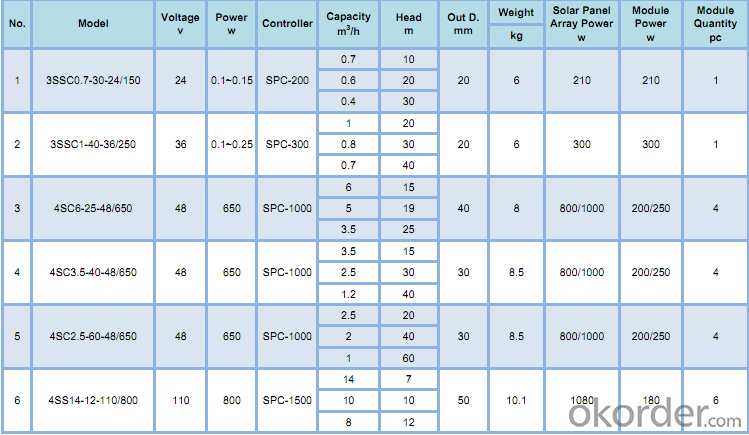
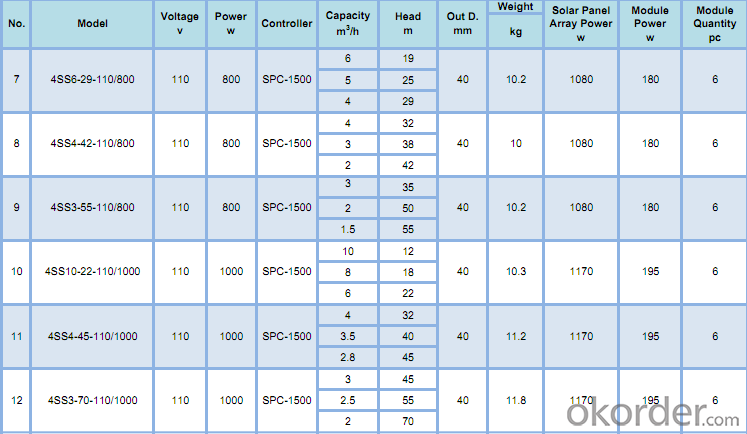
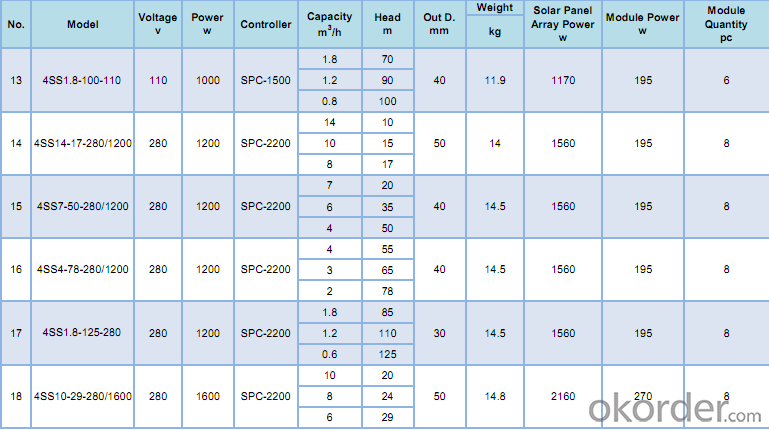
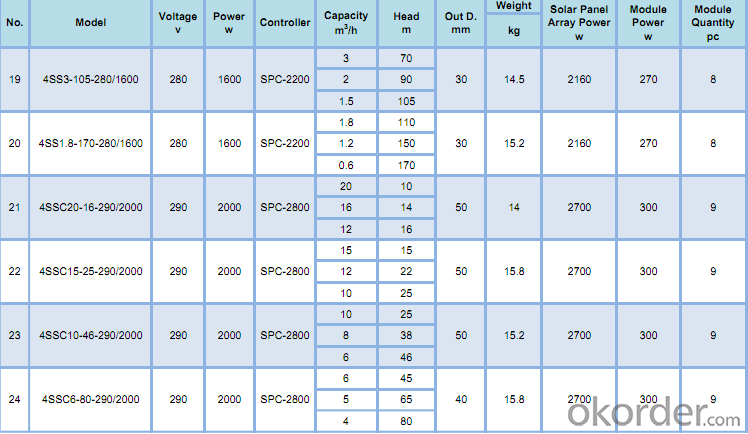
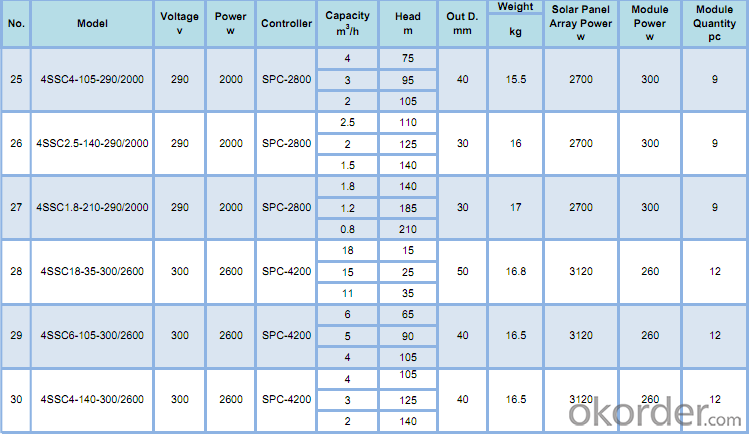
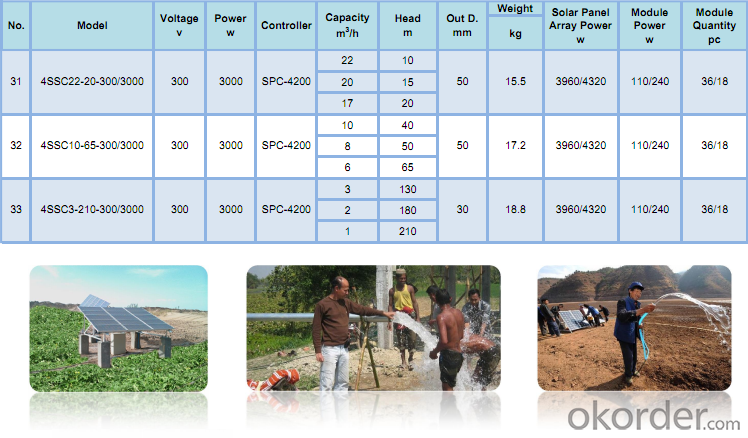
- Q: Can a solar pump be used in areas with limited access to water distribution?
- Yes, a solar pump can definitely be used in areas with limited access to water distribution. Solar pumps are designed to operate using solar energy, which means they require no grid electricity or fuel. This makes them an ideal solution for remote areas where traditional water distribution systems may not be available. Solar pumps can be used to extract water from various sources such as boreholes, wells, rivers, or lakes, providing a reliable and sustainable water supply in areas with limited access to water distribution.
- Q: Solar water heater before the booster pump is now changed into tap water how to get
- The water level or water pressure of your tap water is higher than that of solar water heater, and can not be higher than six meters, more than six meters, close to the water tank capacity, easy to leak; if the water level or pressure can not exceed solar energy,
- Q: How does the size of the pumping mechanism affect the performance of a solar pump?
- The size of the pumping mechanism directly affects the performance of a solar pump. A larger pumping mechanism can typically handle a greater volume of water, resulting in higher flow rates and increased overall efficiency. Additionally, a larger mechanism may have stronger suction capabilities, allowing it to extract water from deeper sources. On the other hand, a smaller pumping mechanism may be more suitable for applications with lower water demands or limited space. Therefore, selecting the appropriate size of the pumping mechanism is crucial to ensure optimal performance of a solar pump.
- Q: Are there any limitations to the depth of water a solar pump can lift?
- Yes, there are limitations to the depth of water a solar pump can lift. The maximum depth a solar pump can lift water depends on various factors such as the power output of the solar panels, the efficiency of the pump, and the capacity of the pump. Generally, solar pumps are most effective for lifting water from depths up to around 200 feet (60 meters). Beyond this depth, additional measures such as using multiple pumps in series or employing a different type of pump may be required.
- Q: Can a solar pump be used for water supply in off-grid eco-resorts?
- Yes, a solar pump can definitely be used for water supply in off-grid eco-resorts. Solar pumps utilize energy from the sun to power the water pumping system, making them a sustainable and environmentally friendly option for off-grid locations. These pumps can be used to extract water from wells, rivers, or other water sources, and supply it to the eco-resort for various purposes such as drinking water, irrigation, or general water supply. Solar pumps offer several advantages for off-grid eco-resorts. Firstly, they operate independently of the electrical grid, eliminating the need for expensive and complicated infrastructure to bring electricity to remote areas. This makes them a cost-effective solution for water supply in off-grid locations. Additionally, solar pumps have minimal operating costs as they do not require fuel or electricity to run, reducing the overall maintenance expenses for the eco-resort. Moreover, solar pumps are silent, clean, and do not produce any emissions, making them compatible with the eco-friendly principles of off-grid resorts. They can be easily integrated into the existing infrastructure of the resort, providing a reliable and sustainable water supply solution without negatively impacting the environment. It is important to consider factors such as water demand, available sunlight, and the size and capacity of the solar pump when determining its suitability for an off-grid eco-resort. Proper planning and sizing of the solar pump system, along with efficient water management practices, can ensure a constant and reliable water supply for the resort while minimizing environmental impact. Overall, using a solar pump for water supply in off-grid eco-resorts is a viable and sustainable solution that aligns with the principles of eco-tourism and environmentally conscious practices. It offers a reliable, cost-effective, and eco-friendly way to meet the water needs of the resort while reducing its carbon footprint.
- Q: Can a solar pump be used for pool heating?
- Yes, a solar pump can be used for pool heating. Solar pumps are designed to circulate water using energy from the sun, making them an environmentally friendly and cost-effective option for pool heating. The solar pump works by capturing the heat from the sun and transferring it to the pool water as it circulates through the pump. This process helps to increase the temperature of the pool water, providing a comfortable swimming experience even during cooler months. Additionally, solar pumps require little to no maintenance and have a long lifespan, making them a popular choice for pool owners who want to reduce their energy consumption and save on heating costs.
- Q: How does a solar pump handle water pressure regulation?
- A solar pump handles water pressure regulation through a combination of mechanisms. It typically includes a controller that monitors and adjusts the speed of the pump based on the water demand. This allows the pump to maintain a steady water pressure by adjusting the flow rate accordingly. Additionally, some solar pumps may have built-in pressure sensors or valves that help regulate the water pressure by controlling the pump's operation. Overall, these mechanisms ensure that the solar pump effectively handles water pressure regulation in a reliable and efficient manner.
- Q: What is the maximum pressure a solar pump can generate?
- The maximum pressure a solar pump can generate depends on various factors such as the specific model and design of the pump, the amount of sunlight available, and the pumping system's efficiency. However, solar pumps typically have the capability to generate pressures ranging from 20 to 100 pounds per square inch (psi) or higher.
- Q: Can a solar pump be used for industrial applications?
- Yes, a solar pump can be used for industrial applications. Solar pumps are increasingly being utilized in industries such as agriculture, water treatment, and manufacturing. They are reliable, cost-effective, and environmentally friendly alternatives to traditional pumps that rely on fossil fuels or grid electricity.
- Q: Can a solar pump be used for water supply in commercial buildings?
- Yes, a solar pump can be used for water supply in commercial buildings. Solar pumps are efficient and cost-effective solutions for providing water in commercial settings. They use solar energy to operate, which makes them environmentally friendly and reduces operating costs. These pumps can be used to supply water for various purposes, such as irrigation, plumbing systems, or even fire suppression systems in large commercial buildings. Their versatility and reliability make them a suitable option for meeting the water supply needs of commercial buildings. Additionally, solar pumps require minimal maintenance and have a long lifespan, making them a sustainable choice for water supply in commercial settings.
Send your message to us
Pondmax Solar Pump - Passive Solar Water Heater for Irrigation
- Loading Port:
- Shanghai
- Payment Terms:
- TT OR LC
- Min Order Qty:
- 1 set
- Supply Capability:
- 1000 set/month
OKorder Service Pledge
OKorder Financial Service
Similar products
Hot products
Hot Searches
Related keywords
